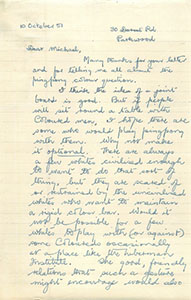1951: Julius Lewin Letter (race relations and table tennis)

Julius Lewin (far right) with other major South African anti-apartheid figures
Johannesburg 1952
Complete caption (click triangle)
(author of Cry the Beloved Country), Anne Paton,
Manilil Gandhi (Mahatma Gandhi's second son), and Julius Lewin.
Photograph is from a page in a family photo album inherited by Michael.
(And an article brings together Gandhi, Duncan, Paton, and Lewin in 1952.
See the paragraph that starts "Manilal eventually joined the campaign...".)
Julius Lewin (1907-1984) was Michael's uncle, the younger brother of Michael's mother (as shown in the right-hand sepia family photo on this site. He was a favorite uncle of Michael's, and the two of them wrote letters to each other over many decades.
Jules was also an emiment civil rights lawyer and professor at the University of the Witwatersrand, an advisor to the African National Congress (ANC), and more. A three paragraph biography at the Wits archives states:
Julius Lewin was born in Oudtshoorn in 1907, and was educated at the University of Cape Town (B.A.1928, Ll.B. 1930). He practised at the Bar in Cape Town 1931-1933 and at the Middle Temple in London, 1936, later working as a Research Assistant and Tutor in the Colonial department of the university of London and as a lecturer at the London School of Economics.
From 1939-1967 he was a lecturer, later Senior Lecturer, later Associate Professor in the Department of Social Anthropology and African Government at the University of the Witwatersrand. He emigrated to England in 1968, first taking up a research fellowship at the University of Manchester. Later he was visiting professor of public law at Columbia University, New York, {1969) and then he worked at the North East London Polytechnic.
He was a prolific writer, producing 4 books and a great number of articles in British, American and South African journals and newspapers, mainly on the subjects of law and politics in South Africa. He died in 1984.
Jules was also an inspiration to the longtime anti-apartheid activist (and Member of Parliament) Helen Suzman, who had a class with him on native law and administration at Wits. (Like Jules, she was white and Jewish.)
In October 1951 Michael, in his early twenties and in his role in the leadership of the South African Table Tennis Union, wrote to his uncle for advice about a brewing situation within the SATTU. That letter and the relevant details are lost, but Jules wrote back the remarkable, prescient two-page letter shown below.
The text of the letter is shown directly below, while a scan is shown at right (Click to enlarge).
10 October 51
30 Dotsel Rd
Parkwood
Dear Michael,Many thanks for your letter and for telling me all about the pingpong colour question.
I think the idea of a joint board is good. But if people will sit round a table with Coloured men, I hope there are some who would play pingpong with them. Why not make it optional. There are always a few whites civilized enough to want to do that that sort of thing, but they are scared of or restrained by the uncivilised whites who want to maintain a rigid colour bar. Would it not be possible for a few whites to play with (or against) some Coloureds occasionally at a place like the Hiberman (sp?) Institute. The good, friendly relations that such a gesture might encourage would also make easier the discussion of the issues you refer to. We should not let those with strong colour prejudices impose them on others free from the disease. Where there is a will, there is nearly always a practical way to be found whereby some decent sort of race relations can be maintained. The whole world, as the UN Charter and debates show, is setting its face against racial discrimination and it seems to me up to us to save our country from the disasters that will overtake it if we don't mend our ways. Every act of friendship across the colour line helps and prevents bitterness and hatred from growing in the hearts of non-whites. Have you read Kingsblood Royal (S. Lewis) and Without Magnolias (B. Moon)?
With good wishes,
from Julius
